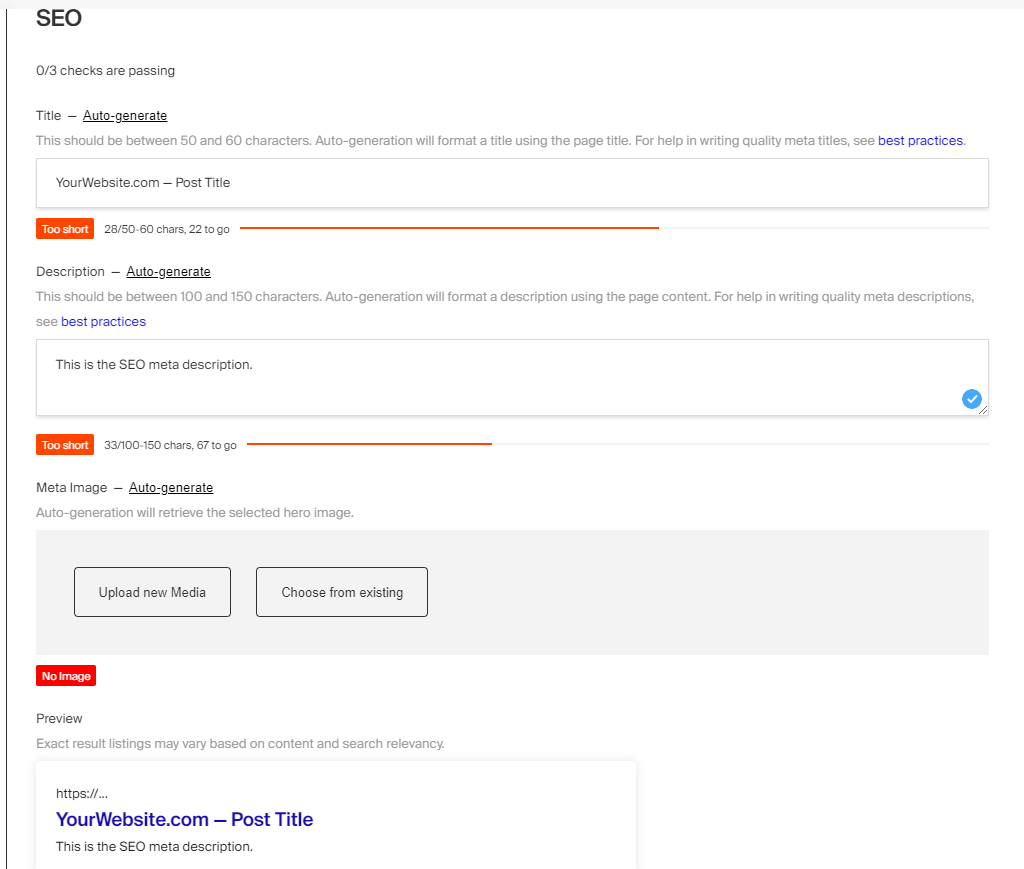
Security News
vlt Launches "reproduce": A New Tool Challenging the Limits of Package Provenance
vlt's new "reproduce" tool verifies npm packages against their source code, outperforming traditional provenance adoption in the JavaScript ecosystem.
@payloadcms/plugin-seo
Advanced tools
A plugin for Payload CMS to auto-generate SEO meta data based on the content of your documents.
Core features:
meta field to every SEO-enabled collection or global. It:
yarn add @payloadcms/plugin-seo
# OR
npm i @payloadcms/plugin-seo
In the plugins array of your Payload config, call the plugin with options:
import { buildConfig } from 'payload/config';
import seo from '@payloadcms/plugin-seo';
const config = buildConfig({
collections: [
{
slug: 'pages',
fields: []
},
{
slug: 'media',
upload: {
staticDir: // path to your static directory,
},
fields: []
}
],
plugins: [
seo({
collections: [
'pages',
],
uploadsCollection: 'media',
generateTitle: ({ doc }) => `Website.com — ${doc.title.value}`,
generateDescription: ({ doc }) => doc.excerpt
})
]
});
export default config;
collections : string[] | optional
An array of collections slugs to enable SEO. Enabled collections receive a meta field which is an object of title, description, and image subfields.
globals : string[] | optional
An array of global slugs to enable SEO. Enabled globals receive a meta field which is an object of title, description, and image subfields.
uploadsCollection : string | optional
An upload-enabled collection slug, for the meta image to access.
tabbedUI : boolean | optional
Displays meta fields as tabs using Payload's Tabs Field. Defaults to false.
generateTitle : method | optional
A function that allows you to return any meta title, including from document's content.
seo({
...
generateTitle: ({ doc, locale }) => `Website.com — ${doc?.title?.value}`,
})
generateDescription : method | optional
A function that allows you to return any meta description, including from document's content.
seo({
...
generateDescription: ({ doc, locale }) => doc?.excerpt?.value
})
generateImage : method | optional
A function that allows you to return any meta image, including from document's content.
seo({
...
generateImage: ({ doc, locale }) => doc?.featuredImage?.value
})
generateURL : method | optional
A function called by the search preview component to display the actual URL of your page.
seo({
...
generateURL: ({ doc, locale }) => `https://yoursite.com/${doc?.slug?.value}`
})
All types can be directly imported:
import {
PluginConfig,
GenerateTitle,
GenerateDescription
GenerateURL
} from '@payloadcms/plugin-seo/types';
To actively develop or debug this plugin you can either work directly within the demo directory of this repo, or link your own project.
This repo includes a fully working, self-seeding instance of Payload that installs the plugin directly from the source code. This is the easiest way to get started. To spin up this demo, follow these steps:
cd YOUR_PLUGIN_REPO && yarn && cd demo && yarn && yarn devhttp://localhost:3000/admin in your browserdev@payloadcms.com and password testThat's it! Changes made in ./src will be reflected in your demo. Keep in mind that the demo database is automatically seeded on every startup, any changes you make to the data get destroyed each time you reboot the app.
You can alternatively link your own project to the source code:
cd YOUR_PLUGIN_REPO && yarn && cd demo && cp env.example .env && yarn && yarn devcd back into your own project and run, yarn link @payloadcms/plugin-seocd node_modules/react && yarn link && cd ../react-dom && yarn link && cd ../../cd YOUR_PLUGIN_REPO && yarn link react react-domAll set! You can now boot up your own project as normal, and your local copy of the plugin source code will be used. Keep in mind that changes to the source code require a rebuild, yarn build.
You might also need to alias these modules in your Webpack config. To do this, open your project's Payload config and add the following:
import { buildConfig } from "payload/config";
export default buildConfig({
admin: {
webpack: (config) => ({
...config,
resolve: {
...config.resolve,
alias: {
...config.resolve.alias,
react: path.join(__dirname, "../node_modules/react"),
"react-dom": path.join(__dirname, "../node_modules/react-dom"),
payload: path.join(__dirname, "../node_modules/payload"),
"@payloadcms/plugin-seo": path.join(
__dirname,
"../../payload/plugin-seo/src"
),
},
},
}),
},
});

FAQs
SEO plugin for Payload
The npm package @payloadcms/plugin-seo receives a total of 23,480 weekly downloads. As such, @payloadcms/plugin-seo popularity was classified as popular.
We found that @payloadcms/plugin-seo demonstrated a healthy version release cadence and project activity because the last version was released less than a year ago. It has 0 open source maintainers collaborating on the project.
Did you know?

Socket for GitHub automatically highlights issues in each pull request and monitors the health of all your open source dependencies. Discover the contents of your packages and block harmful activity before you install or update your dependencies.

Security News
vlt's new "reproduce" tool verifies npm packages against their source code, outperforming traditional provenance adoption in the JavaScript ecosystem.

Research
Security News
Socket researchers uncovered a malicious PyPI package exploiting Deezer’s API to enable coordinated music piracy through API abuse and C2 server control.

Research
The Socket Research Team discovered a malicious npm package, '@ton-wallet/create', stealing cryptocurrency wallet keys from developers and users in the TON ecosystem.